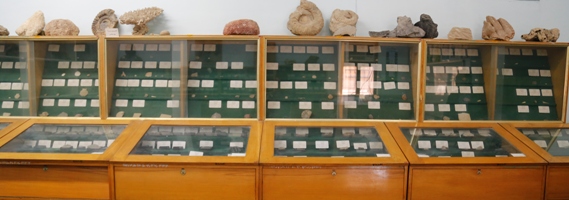FACULTIES OF SCU
- Faculty of Science
- Faculty of Sport Sciences
- Faculty of the Arts
- Faculty of Mathematical Sciences & Computer
- Faculty of Veterinary Medicine
- Faculty of Earth Sciences
- Faculty of Agriculture
- Faculty of Engineering
- Faculty of Water and Environmental Engineering
- Faculty of Economics & Social Sciences
- Faculty of Education & Psychology
- Faculty of Letters and Humanities
- Faculty of Theology & Islamic Studies
CONTACT US
Office of the Dean of the Faculty:
Tel.: +98 61 3333 0136
Fax: +98 61 3333 1059
The Dean's Adviser for Interntional Affairs:
Dr. Kazem Rangzan
Tel.: +98 916 313 0709
E-mail: Kazemrangzan@scu.ac.ir
FACULTY OF EARTH SCIENCES

History
The history of the Faculty of Earth Sciences dates back to the establishment of the geology department in 1970 and at the time was affiliated to Science College of Jondishapour University. From 1970 to 1979 the main objective of the department was to offer courses for undergraduate students in the field of geology and to train the qualified manpower for the private and public sectors. From 1978 to 1981 as a result of unwanted circumstances the department activity totally suspended and most of the academic members left the department. The department reopened again in 1982 and started its work with five academic members and designed to develop the general geology courses for graduate students. Since 1983 the number of academic members in geology field is increased and now is 19 people. In 1996, the first group of MSc students in hydrogeology field joined the department and at present the geology department affording five professional MSc and three PhD courses. The expansion of the department was so rapid and in 2010, the geology department was recognized as the Faculty of Earth Sciences and there are two departments in the faculty.
Aim and Scope
Khuzestan is the wealthiest and fastest growing province of Iran. Proximity with Persian Gulf and Ilam, Lorestan, Kohgiluyeh and buyer Ahmad and Chaharmahal and Bakhtiari created a strategic position for the earth sciences faculty. Since Khuzestan is the wealthiest and fastest growing province of Iran, exploration, optimize exploitation of resources and management in various areas have the fundamental role in sustainable development. Of the most important wealth of Khuzestan are oil industry, sugar cane and agricultural production and water resource. Efficient use of these resources requires precise information about them.
Faculty members and students at the Faculty of Earth Sciences focus on various areas to meet the needs of a growing population. So, the program of the faculty is projected to train qualified and skilled personnel and researchers in different fields of geology and GIS. Emphasis is placed on growing the scholar's abilities to decipher the dilemmas related to water resources, economic minerals, petroleum and environment and efficient use of these resources requires precise information about them.

